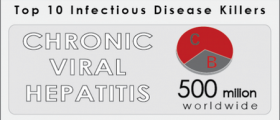
Hepatitis is a medical condition characterized by the inflammation of the liver and by the presence of inflammatory cells in the tissue of this organ. Hepatitis is acute when it lasts less than six months. It may be caused by various reasons and it may sometimes heal on its own or progress to scarring and cirrhosis of the liver. Acute hepatitis B is the infectious disease caused by hepatitis B virus. This disease is very contagious and it has already caused epidemics in certain parts of the world. It is estimated that about a quarter of the world’s population have been infected with this virus. At any given point there are 350 million chronic carriers of the virus.Causes of acute hepatitis B
Acute hepatitis B is contracted by exposure to infectious blood or body fluids. The hepatitis B virus can be present in the semen and vaginal fluids, and even in the saliva, tears and urine of some chronic carriers. This virus cannot be spread by casual contact and it is considered safe to hold hands, share eating utensils, kiss, hug or be close to the infected person. The virus cannot be spread neither by breast-feeding, coughing or sneezing. Transmission normally results from exposure to infectious blood or bloody fluids and usually during the blood transfusion, sharing of the needles, from mother to child during childbirth and during the sexual contact. About 30% of reported cases cannot be associated with any known cause.
Signs and symptoms of acute hepatitis B
The symptoms of acute hepatitis B are associated with infections with the virus and manifest as general malaise, loss of appetite, gastrointestinal upset, vomiting, mild fever, painful joints and muscles, darker than normal urine and jaundice. Jaundice is a yellowish pigmentation of the skin caused by increased levels of bilirubin in the blood. In acute hepatitis B, patients’ skin will become yellowish as well as the conjunctival membranes (whites) of the eye. In most cases, the illness will last for a couple of weeks before the clinical picture improves. However, small number of patients can get rapidly progressive acute liver failure and die. Acute liver failure indicates severe damage to the liver, where 80-90% of liver cells have died. About 80% of patients with this complication will die. However, liver transplantation and multidisciplinary intensive care can improve the general outlook and short term survival to more than 65%.
Treatment for acute hepatitis B
Acute hepatitis B usually resolves on its own. Small number of patients may require early antiviral treatment.
















Your thoughts on this
Loading...